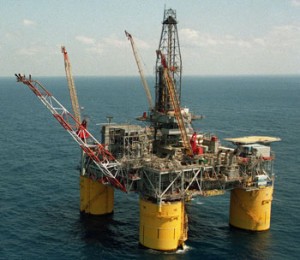 A new study by the Associated Press finds that during the past 36 years, US oil production increases did not correlate to lower US gasoline prices at the pump. When we produced more oil, the prices we paid for a gallon of gasoline did not drop. (see article here)
A new study by the Associated Press finds that during the past 36 years, US oil production increases did not correlate to lower US gasoline prices at the pump. When we produced more oil, the prices we paid for a gallon of gasoline did not drop. (see article here)
The dishonest spin put on this study is that drilling makes no difference: Oil is that rare, magical commodity not subject to the normal laws of supply and demand. As CBS and other news outlets put it:
It’s the political cure-all for high gas prices: Drill here, drill now. But more U.S. drilling has not changed how deeply the gas pump drills into your wallet, math and history show.
That conclusion — drilling makes no difference — is meant to give cover to the Obama administration’s active program to close off or sharply curtail US oil exploration and production on most federal lands, including off shore. As the President keeps saying, US oil production is up on his watch. What he hasn’t said is that most of those increases have occurred on state and private lands where the Obama administration has been unable to block exploration.
But the AP study only tells part of the story.
Oil prices are in fact kept artificially high by the Saudis and other members of the oil producing states. They constantly adjust their outputs higher or lower to maximize the cost of a barrel of oil, something they are able to do because they control such a large percentage of the world supply. They operate exactly like the De Beers family does in controlling the prices of diamonds. Gem grade diamonds are not particularly rare, but retail prices are kept high because De Beers and its many confederates tightly control how many diamonds are on the market at any given time.
But if the US were to suddenly discover a wealth of gem grade diamonds here in this country, that discovery, and those diamonds once they were put on the market, would shift the balance of power. The same is true for oil.
As long as our government refuses to permit the vigorous development of US oil resources — and with new technologies that can extract oil from oil sands, oil shales and deep off shore wells, our theoretical share of the total world oil supply keeps increasing every day — the US has no power to shift world oil prices, except by reducing consumption. Developing our domestic oil supply would gradually shift the balance of power in what is now a very one-sided game.
What’s needed is a national mandate to develop known US oil resources and to explore for more, a mandate that could not be held hostage to every political whim in Washington. Such a program would have a stabilizing effect on the world oil markets.
But more importantly, a serious program to develop our own oil resources would gradually reduce the amount of oil we purchase from the Gulf states, making us less dependent on their unstable regimes.
It is magical thinking to believe that we don’t need oil. You might as well believe in unicorns and leprechauns. Oil has a higher energy density than every other modern power source, except for nuclear energy. (Which is why we are foolish to put so many obstacles in the way of nuclear power plants, a subject for another time.)
Anyone can see that this is true by comparing a 2012 Chevy Volt, which despite it’s very expensive bank of batteries can only travel 40 miles on a charge, and my 1999 Mazda 4-cylinder gas powered beater, which routinely gets me 350 miles between fill ups. Oil is still the best choice for many modern energy needs, especially for transportation.
Someday, we may power our cars with hydrogen fuel cells. We need to keep developing wind power, solar power, geothermal power, and other inefficient, expensive technologies. These will all play a part in diversifying our energy portfolio, and diversification is a good thing. But let’s not forget that despite billions of dollars of investment and huge government subsidies (which will be paid by our children), the US still only produces less than one-half of one percent of its energy needs from alternative sources.
These technologies may someday play a significant role in our energy supply, but that day is not today. And it is not tomorrow.
Today and tomorrow, we need oil, and lots of it. America is an industrial economy and most of us are not Luddites. Even the Occupy Wall Street crowd, living communally in tents and sleeping bags, were unwilling to give up their smart phones and laptops, high speed internet and social networking. American life depends heavily on the use of technology, and the life blood of all technology is energy.
It is dangerous to continue to depend on Arab oil; it is woefully naïve to pretend that we can close off access to the rich and growing US supply of oil resources and continue to be an industrial and technological world leader.
Drilling for oil will not magically solve all of our energy challenges, but Washington’s failure to get serious about developing US oil resources threatens to starve the US economy of the oxygen it needs to maintain our global technological leadership, and to build a robust economy that can support us, and our children.
Photo credit: Times-Picayune archive


The proposal from Govt backed schemes for free solar energy panels is legitimate – but but there strings attached and consequences – it has to be remembered that ‘the only free cheese is in a mousetrap’